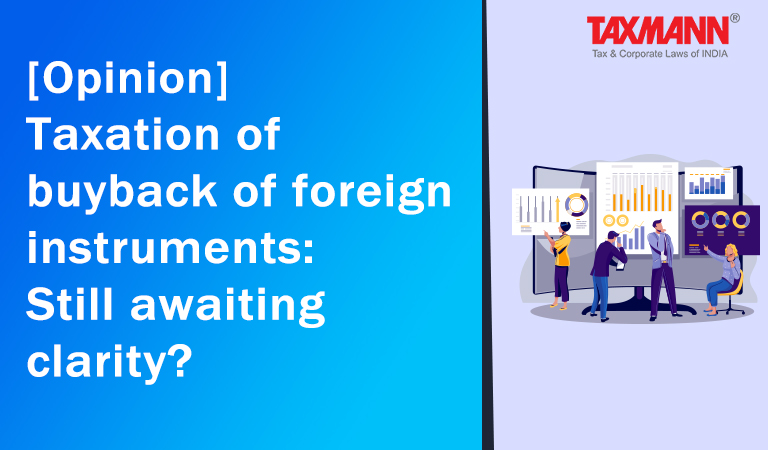[Opinion] Taxation of buyback of foreign instruments: Still awaiting clarity?
- Blog|News|Income Tax|
- 3 Min Read
- By Taxmann
- |
- Last Updated on 21 October, 2022

Rohith K Rangan – [2022] 143 taxmann.com 258 (Article)
Buyback has been a time-tested and popular method for the management to repatriate cash to shareholders and boost the economic value of the company. Tax regimes all-over the world have been slow to react to taxing this method of capital repatriation. India too introduced taxing provisions of sections 46A and 115QA in the Income-tax Act, 1961 (“Act”), around the turn of the millennium. Each of these sections serve different purposes, namely:
- 115QA – Taxation of buyback of shares of domestic company in the hands of the company
46A – Taxation of buyback of shares of “other companies” or specified securities of companies, in the hands of shareholders
In this article we will focus on taxation of buyback governed by section 46A of the Act with a pointed eye on buyback of foreign instruments.
Legal provisions
As per provisions of section 46A, buyback of the following cases shall be deemed to be capital gains in the hands of the shareholder:
- Buyback of shares of foreign companies
- Buyback of specified securities of any company
As per provisions of section 48, the difference between the cost of acquisition and the value of consideration received is charged as the capital gains in the year in which such shares or other specified securities are repurchased. Further, any cost of improvement and expenditure incurred exclusively for such transfer is also allowable under section 48. Thus, in these cases no buyback tax under section 115QA, is levied in the hands of the company.
“Specified securities” are defined as per section 68 of the Companies Act to include employees’ stock option or other securities as may be notified by the Central Government from time to time.
The context leading to the genesis of section 46A, explains its purpose succinctly. The newly introduced provisions of buyback via the Companies Act ordinance created a void in taxation of the transaction and lacked clarity thereby, taxing it as deemed dividend as per section 2 of the Act. The memorandum to Finance Act 1999 explains as follows:
“…. newly introduced provisions of buy-back of shares has thrown open certain issues in relation to the existing provisions of Income-tax Act. The two principal issues are whether it would give rise to deemed dividend under section 2(22) of the Income-tax Act and whether any capital gains would arise in the hands of the shareholder. The legal position on both the issues are far from clear and settled and there is apprehension that there will be unnecessary litigation unless the issues are clarified with finality. It is, therefore, proposed to amend clause (22) of section 2 of the Income-tax Act by inserting a new clause to provide that dividend does not include any payment made by a company on purchase of its own shares in accordance with the provisions contained in section 77 of the Companies Act, 1956….”
Here, the author wishes to interject the logical flow of thought, referring to CBDT Circular No.6/2016. The Circular states that shares and other securities can be held either as capital assets or stock-in-trade/ trading assets or both. It further states that, in respect of listed shares and securities if the assessee itself, irrespective of the period of holding the listed shares and securities, opts to treat them as stock-in-trade, the income arising from transfer of such shares/securities would be treated as business income. Therefore, the author wants the readers to appreciate a scenario where shares are held as stock-in-trade rather than as investments.
It is also pertinent to note the usage of the word “consideration”, which indicates that not only currency but consideration received in any form such as property/virtual digital assets, shall be included. The rudimentary classification of instruments as shares and debentures is also required to truly appreciate the application of this section. This becomes very important for Indian resident corporates and individuals in the light of the new ODI rules and regulations introduced.
Click Here To Read The Full Article
Disclaimer: The content/information published on the website is only for general information of the user and shall not be construed as legal advice. While the Taxmann has exercised reasonable efforts to ensure the veracity of information/content published, Taxmann shall be under no liability in any manner whatsoever for incorrect information, if any.

Taxmann Publications has a dedicated in-house Research & Editorial Team. This team consists of a team of Chartered Accountants, Company Secretaries, and Lawyers. This team works under the guidance and supervision of editor-in-chief Mr Rakesh Bhargava.
The Research and Editorial Team is responsible for developing reliable and accurate content for the readers. The team follows the six-sigma approach to achieve the benchmark of zero error in its publications and research platforms. The team ensures that the following publication guidelines are thoroughly followed while developing the content:
- The statutory material is obtained only from the authorized and reliable sources
- All the latest developments in the judicial and legislative fields are covered
- Prepare the analytical write-ups on current, controversial, and important issues to help the readers to understand the concept and its implications
- Every content published by Taxmann is complete, accurate and lucid
- All evidence-based statements are supported with proper reference to Section, Circular No., Notification No. or citations
- The golden rules of grammar, style and consistency are thoroughly followed
- Font and size that’s easy to read and remain consistent across all imprint and digital publications are applied



 CA | CS | CMA
CA | CS | CMA
